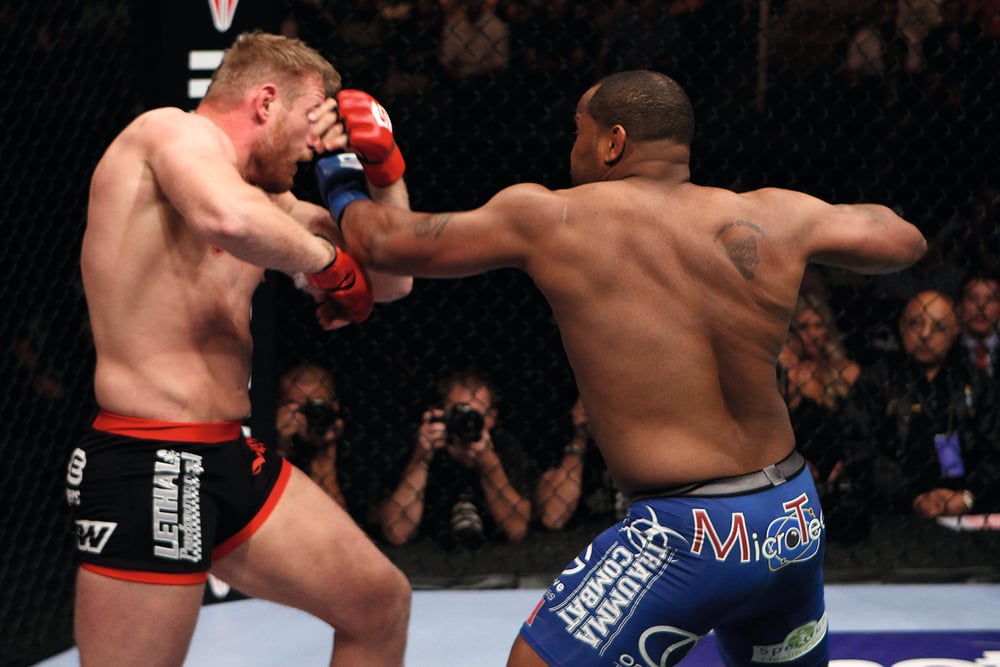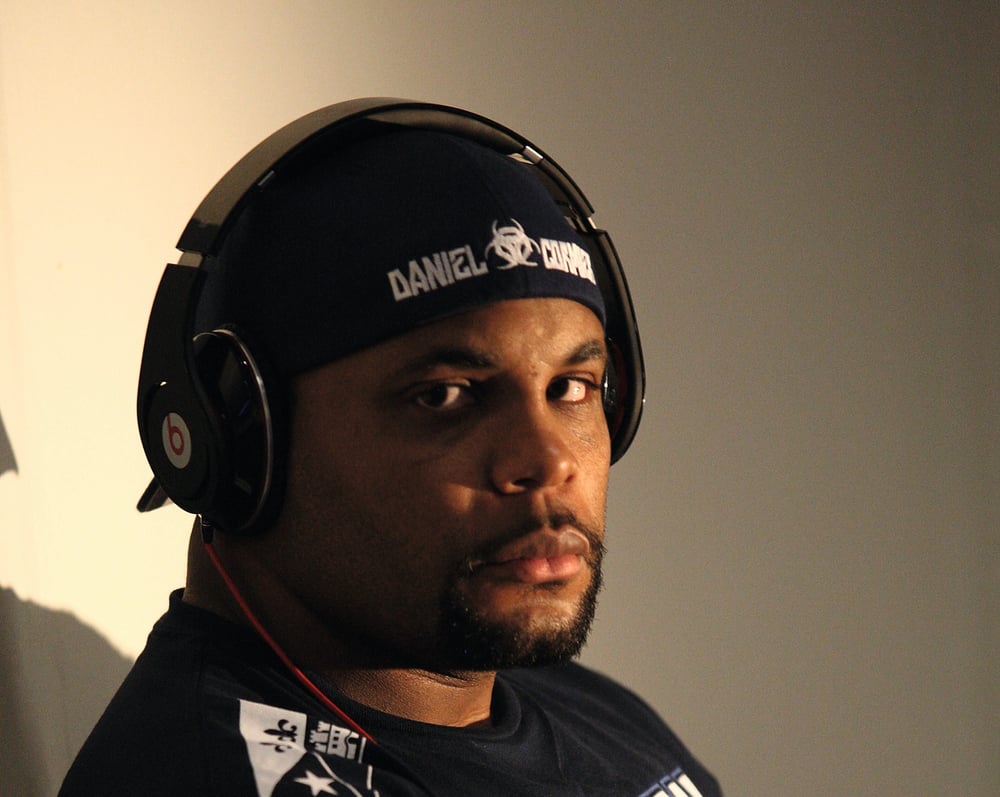
Issue 092
September 2012
He’s climbed spectacularly to the upper echelons of Strikeforce, yet 10-0 Daniel Cormier insists walking out in the Olympic Games opening ceremony remains the greatest moment in his sporting life
OLYMPIC ISSUE
DANIEL CORMIER
Freestyle Wrestling
Fourth - 2004
No stranger to the podium, Cormier took bronze at the 2007 Pan-Ams
Daniel Cormier won’t be making the trip to London this summer, but the former Olympic wrestler will wear a permanent smile when he watches his fellow countrymen grapple for their dreams made of gold.
“My Olympic experience is something I will look back on for the rest of my life,” says the 33-year-old Cormier, who competed for the United States in the 2004 Games and captained the team in 2008. “Every time I think about those memories I get a big ol’ smile on my face. When you get to the Olympic Games, there is just nothing like it.”
While outside observers may think Cormier’s culminating moment in the sport came when he took fourth place in the 2004 Games, or perhaps when he was named team captain of the 2008 Olympic squad, Cormier reveals that it remains the opening ceremony in Athens in 2004 which is permanently entrenched at the top of his memory bank.
“There is nothing like walking out during the opening ceremony. When the US team comes out, the ovation is just insane. Flashing lights everywhere. People are crying. It’s just an experience that I don’t think I can ever match,” says Cormier, flashing back to that summer in Athens — the historic city in Greece that hosted the first modern-day Olympics in 1896.
“I trained to be an Olympic champion so I already knew that I would have success at the Games. But at that moment when I walked out there and my childhood dream was finally a reality, it felt awesome.”
But as sweet as the Olympic highs were for the Louisiana native, who was a three-time prep champion at Northside High School in Lafayette, Louisiana, a two-time junior-college champ at Colby Community College in Kansas, and an NCAA Division I national runner-up at Oklahoma State, his Olympic lows nearly crushed any shot at a future career in combat sports.
“The 2008 games were probably the lowest moment of my life outside of the tragedies with my family. That was by far the lowest part of my athletic career. Nothing even comes close,” admits Cormier, who hours before his very first match at 96kg (211.5lb) had to withdraw due to severe dehydration caused by an extreme weight cut.
Cormier has endured tougher times outside the wrestling arena. His infant daughter died in a car accident in 2003. And when he was seven, his father, Joseph, was shot and killed on Thanksgiving Day. As a junior in high school, a close friend was killed in a car crash. And a year later, Cormier’s cousin died in another auto accident. Then, while attending OSU, Daniel Lawson, a good friend of Cormier’s, perished in a plane crash that killed 10 members of the Cowboys’ basketball team.
But those tragedies were beyond Cormier’s control. Not making weight at the Olympics was something he “probably could have prevented,” he says.
“To know in that one time I didn’t do anything different, but my body had just had enough of it. That was the most disappointing thing about it,” Cormier says, still carrying a tone of disappointment. “If I would have just changed things the way that I knew and people around me knew I should have, it probably wouldn’t have come to that. Or maybe it would have. I don’t know. Doctors told me in that moment my body had just had enough.
“That was probably the most disappointing… but even in 2004 there was disappointment of not getting the gold medal and not even getting to stand on the medal podium after the bronze medal match. As I look back on the Games there are unbelievable highs and terrible, terrible lows.”

But Cormier believes the experience helped him grow personally and professionally. It certainly helped him pave his current career path as a mixed martial artist, instead of choosing the “logical path” that most standout wrestlers do by joining the collegiate coaching fraternity.
“We all coached. I started coaching when I was still wrestling,” he said. “That was just the next step until mixed martial arts opened up as a viable option. You go and are an assistant somewhere at a successful program, then hopefully you become a head coach and start your own program.
“But for so many competitive guys, MMA was a way to still stay competing rather than coaching.”
While Cormier says he never envisions MMA becoming an Olympic sport, because of the role injuries would play over a two-week tournament, he does believe the worldwide surge of mixed martial arts has actually helped wrestling grow.
“As a whole I think it’s helped more than it’s hurt. People understand that in order to be a successful mixed martial artist, wrestling is probably the best base,” Cormier says. “Wrestling is growing at the grass-roots level. I think more kids now are getting in it at a younger age. I mean, wrestling has always been one of the bigger sports at the youth level and I think it’s getting even bigger.
It’s less than three years since he first started fighting professionally, and he wasn’t even named in the original eight-man Strikeforce heavyweight grand prix lineup that was announced 18 months ago. But he quickly made a name for himself filling in as an alternate in September after former champ Alistair Overeem withdrew.
“It was just crazy, a crazy, a crazy ride,” said now 10-0 Cormier, who in his fight against Barnett showed his ever-evolving stand-up game to fans who may have thought he was just a one-dimensional grappler. “Hearing that I could be an alternate; the last thing I wanted to be was an alternate because I didn’t want to fight any of these guys yet.
“Then to be getting to fight Jeff Monson, a guy with over 50 fights in his career. Then getting the call for ‘Bigfoot’ [Silva] was crazy. Now I had to convince myself that I’m at a point in my career where I’m ready for that step up.
“Fighting Josh Barnett, that was the craziest. There was a UFC video game back in 2001, and he was on the cover of it. I stood in the cage on fight night and I was like, ‘Dang, I’m about to fight Josh Barnett. That’s Josh Barnett.’ It was crazy, man. I’m obviously glad it turned out the way it did. It really is hard being a mixed martial artist and this just helped give me more confidence to move forward.”
With most of Strikeforce’s top heavyweight fighters folding into the UFC’s roster, rumors have circulated that Cormier could face a handful of opponents such as Sergei Kharitonov, Pedro Rizzo, or ex-UFC champ Tim Sylvia.
“I don’t care who I fight. All those guys are legends. To fight Fedor would be great. He’s the best heavyweight of all time. And the rest of those guys too,” Cormier says.

One opponent Cormier doesn’t see himself facing anytime in the near future is American Kickboxing Academy teammate and former UFC heavyweight champion Cain Velasquez.
Velasquez would first have to get past Junior Dos Santos in their rematch, which has been targeted for UFC 152 on September 22 at Air Canada Centre in Toronto. Then Cormier would have to either win a final fight in Strikeforce or jump straight to the UFC (UFC president Dana White said after UFC 146 that Cormier is a certainty to cross over at some point and could even make his promotional debut with a title on the line).
Even if such a currently unrealistic scenario played out, Cormier says a fight between him and Velasquez wouldn’t end up like the war of words that were recently settled between light heavyweight champ Jon Jones and his former Greg Jackson-trained teammate, Rashad Evans.
“It’s different. Rashad and Jon’s situation went south, but me and Cain wouldn’t do that,” Cormier says. “It’s really a pointless question because it’s not our reality right now.”
Besides, Cormier will be busy this summer cheering for his guys in London wearing the red, white and blue singlets.
“Wrestling is my first love and I want to be involved as much as I can with the distance that I’m at (with MMA). Ideally I wouldn’t be so busy and I could spend some time in the Olympic training camp and help those guys prepare. But it doesn’t look like that is going to happen right now with my hand. But I definitely want to stay involved with the Olympic team in the future.”
...









